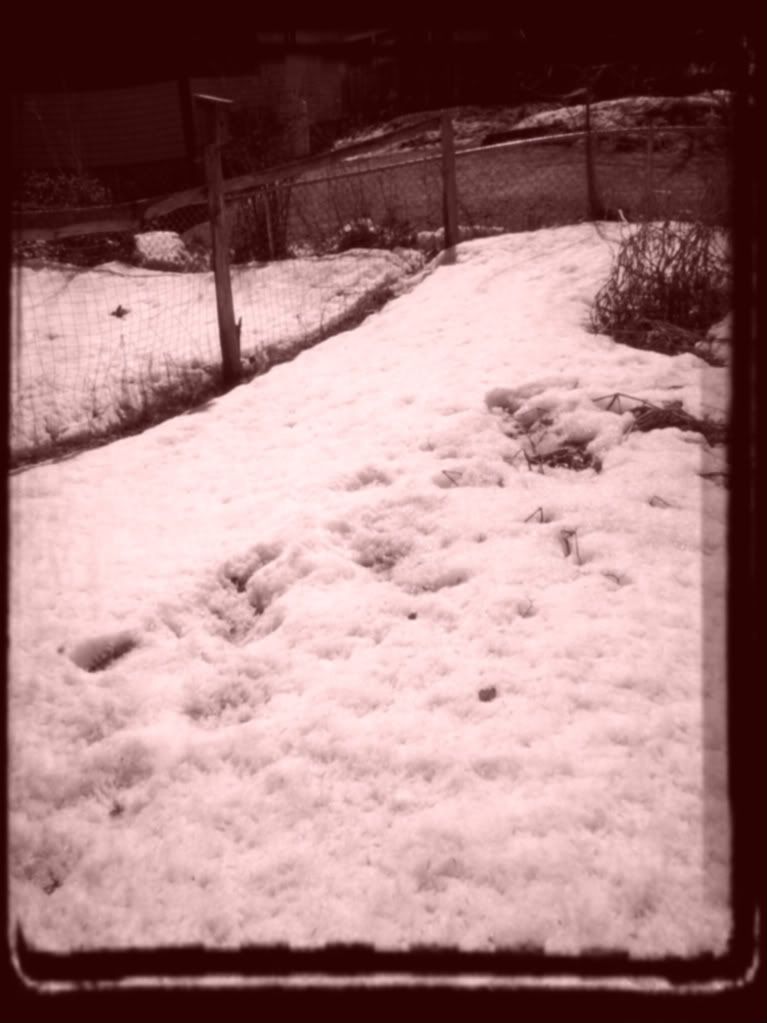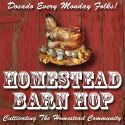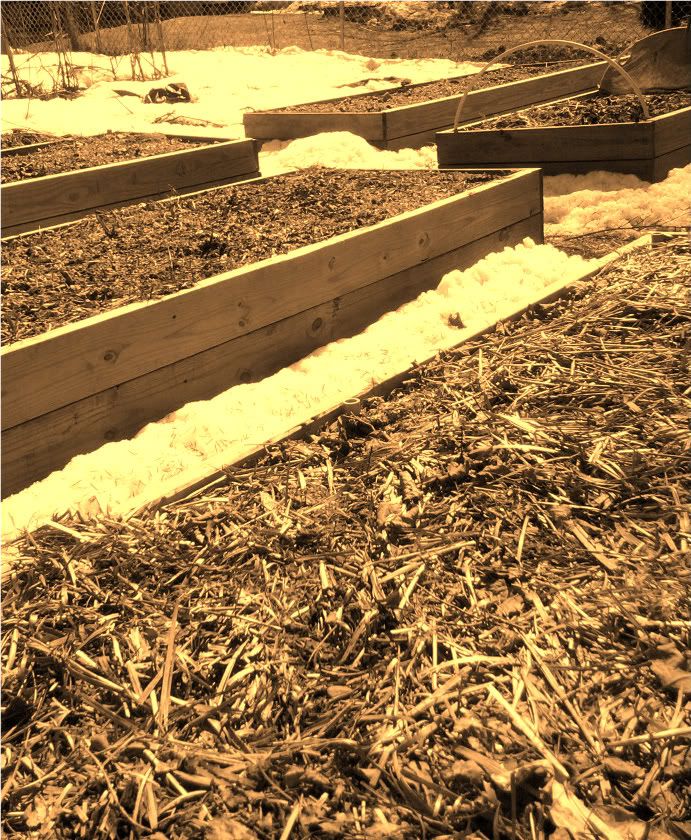The raised garden beds are finally clear of snow, and the soil is warming rapidly. We're expecting a nor'easter on Friday, but Lord willing we'll be planting our spring crops in about 2 weeks.
 |
| Our flat garden plot |
 When you first begin gardening at a new location, I highly recommend Square Foot Gardening by Mel Bartholomew. His methods will allow you to grow all the produce you can eat fresh with a minimum of fuss.
When you first begin gardening at a new location, I highly recommend Square Foot Gardening by Mel Bartholomew. His methods will allow you to grow all the produce you can eat fresh with a minimum of fuss.If you enjoy gardening and want to expand to a garden that can feed your family year round or provide extra produce for a farmer's market, you'll want to pick up The Vegetable Gardener's Bible.
I don't know what area of the country or world you'll be living in, so what works for me may be almost reversed for you, but some gardening wisdom is universal.
- It's all about the soil No matter where you live, invest time and energy to make your soil the very best it can be. Homemade compost is quite literally "black gold". If you see lots of worms, you're headed in the right direction. Greensand is one of my favorite soil conditioners. Composted animal waste also adds valuable nutrients to the soil, but should be put on in the fall so it doesn't burn tender seedlings.
- Invest in Raised Beds Even if you can only put in one per year, the benefits of raised beds are worth the time and expense. Just not having to rototill every year makes a huge difference to the health of your soil (and wallet!). In New England, the ease with which we can put hoop houses and cold frames over raised beds to warm or cool them allows us a much longer growing season. Raised beds self-regulate and allow for productive gardens during cool, rainy summers as well as hot, dry seasons.
- Use Organic Methods Companion flowers, staggered plantings, crop rotation, neem oil, vegetable oil soap, growing vines vertically, cayenne pepper, and hand picking bugs are all methods that keep most diseases and bugs at bay.
- The Best Fertilizer? The gardener's shadow. A few minutes a day keeps little problems from becoming big ones. If you keep your beds weed free daily, your plants aren't robbed of water and nutrients. Bugs and disease are relatively easy to stop when they first occur, too.
- Heavy watering once or twice a week is best. Deep watering produces deep roots which in turn give the healthiest plant and best harvest. Use hay or companion plantings to keep the soil cool and moist at the base of the plant. Soaker hoses and watering wands allow you to keep the leaves of the plants dry and prevent fungus and insect invasions. The only exception is lettuces and corn, both of which have shallow root systems and need daily light watering in addition to their weekly watering.
- Gardens get better as you grow. Properly cared for, each year the soil will be richer and better able to grow crops. You'll learn more each year, too. Don't be discouraged if your gardens don't produce as wonderfully as a friend's.
I hope you have many happy hours out in the sunshine caring for your gardens!
Keep growing in grace,
Mom







your raised beds are gorgeous!
ReplyDeleteThose were my mother's day gift last year from Forest and the boys (who built the actual boxes). What you can't see is a series of sockets built into each box so I can easily put up trellises, hoop houses, and teepees. My men are the best!!!!
ReplyDeleteLove your raised beds! We use them too. Yesterday DH and I helped mother nature out a bit and shoveled 2 feet of snow off of our raised beds yesterday, and covered them with some plastic to hopefully speed things along. We are having a slow spring. I think the neighbors must have thought we were a bit crazy shoveling snow in the middle of our yard LOL.
ReplyDeleteI agree with Andrea, your raised beds are gorgeous! I have heard of square foot gardening, Im not doing it this year, but maybe next year, it looks like such a great idea:) By the way, I love the reason for your blog(Letters to your daughter) that is such a great idea.. I have 3 little girls myself, and hope some day they will read my blog.. From now on I think I will write mine for them:) May the Lord richly bless you!
ReplyDeleteI loved your pictures of your beds...with the snow surrounding them. I realize a lot of the nation is still getting snow...while we are getting humidity and high temps already...and lately strong southerly winds!
ReplyDeleteI love the phrase "Gardener's Shadow" AS BEING THE BEST THING FOR THE GARDEN. Man is meant to work the ground now... so, it makes sense to me that I need to be out there. Some of my Honey's and My best days are spent outdoors working in the garden.
Any tips for companion gardening to corn?
My corn bed isn't very plentiful. Some of my kernals didn't sprout... so i have some room for something else.
Just outside the bed, along the edge of the box... I planted Sunflowers... any suggestions?
Thanks for the post, over from the Barn Hop
Pat
This is the only reliable and frugal method for corn that I know of for organic home gardening. I've never purchased her seeds being from a different region of the country, but her method is right on. I prefer to plant the squash in it's own hill as she diagrams here rather than planting it on the side of the corn and bean hill. http://www.reneesgarden.com/articles/3sisters.html.
ReplyDeleteCorn is a grass, and as such requires enormous volumes of both water and a broad spectrum fertilizer like fish emulsion throughout the growing season. We've found that we put more money into the crop than the corn is worth when we plant it in rows. Corn depends on wind to pollinate, but you can take off the female tassels once they're covered in pollen and bang them on the male ears for better corn production.
If you're determined to have a "corn patch", dress the area with a full inch of compost or composted manure before planting. Plant in squares rather than rows for best results. Plan on regular irrigation, fertilizing and cultivating every 2 weeks, and some hand pollination, especially around the edges. Water extra heavily from flowering to harvest.
Grass thrives on nitrogen, so beans are great companions. Bush beans will keep corn's "feet" moist and cool, which it loves.
Corn is one of my favorite garden veggies, and well worth growing. Grown in "three sisters" formation, it does very, very well with just a little extra water.
I hope this helps! :-)
I found your blog from the Homestead Barn Hop. I love the concept for writing letters to your daughter :) My least successful attempt at homesteading is in the garden so any basic tips are fantastic.
ReplyDelete